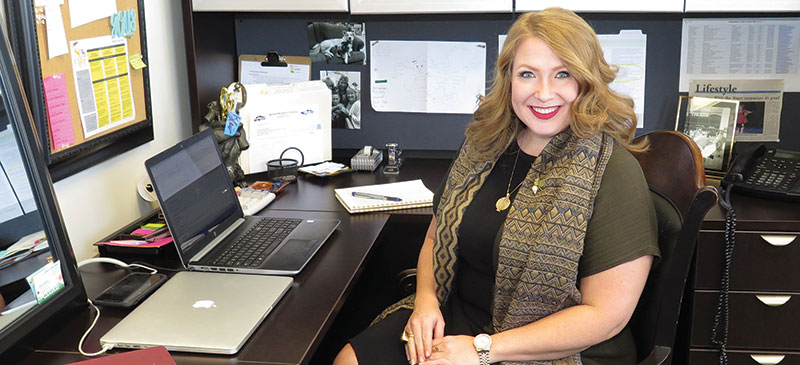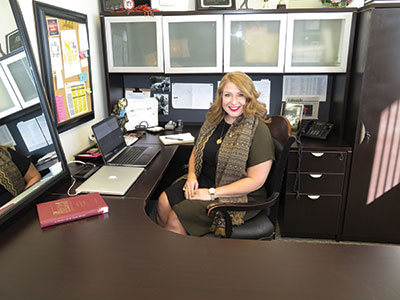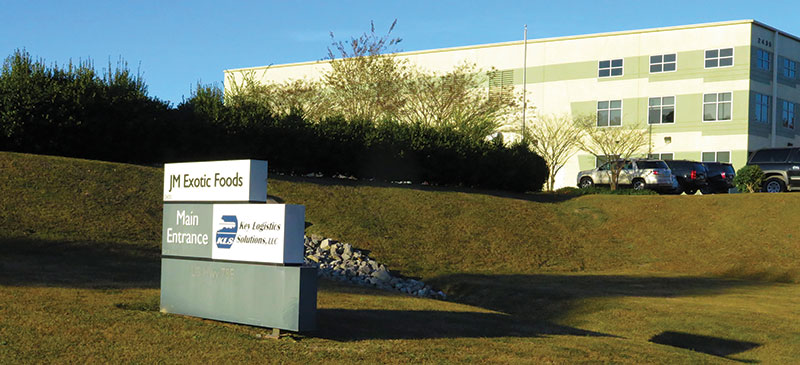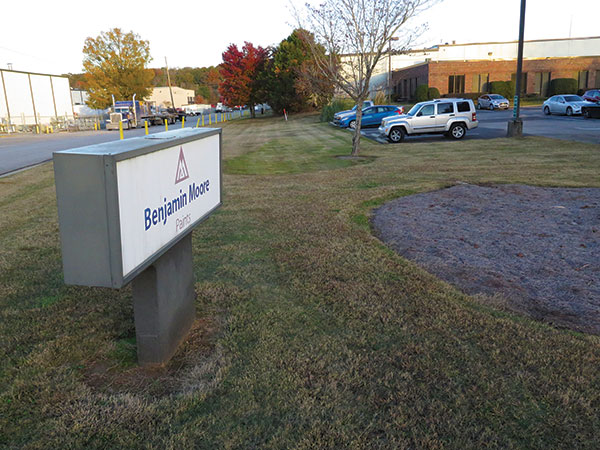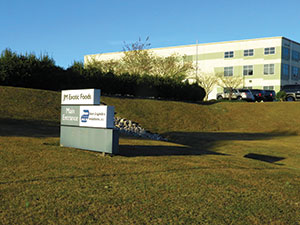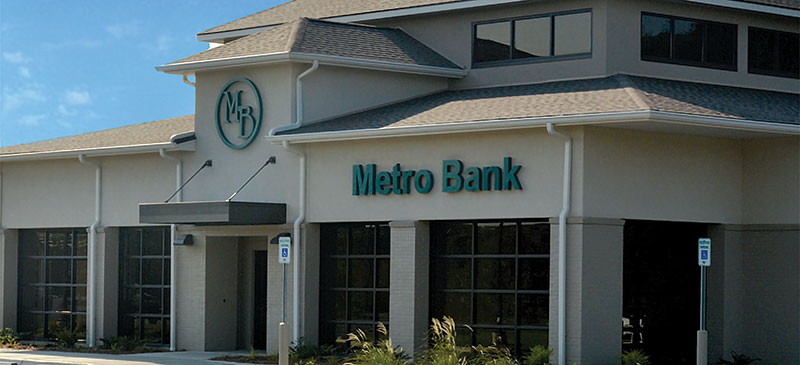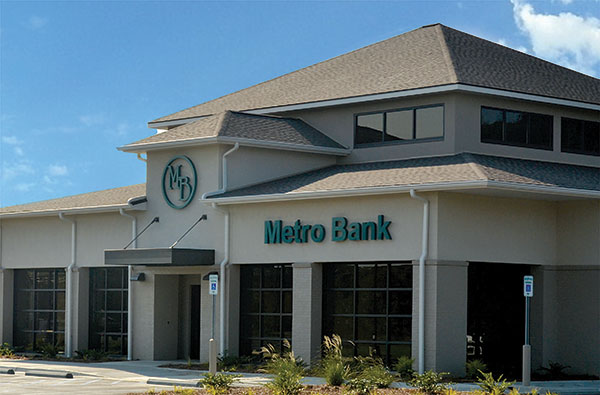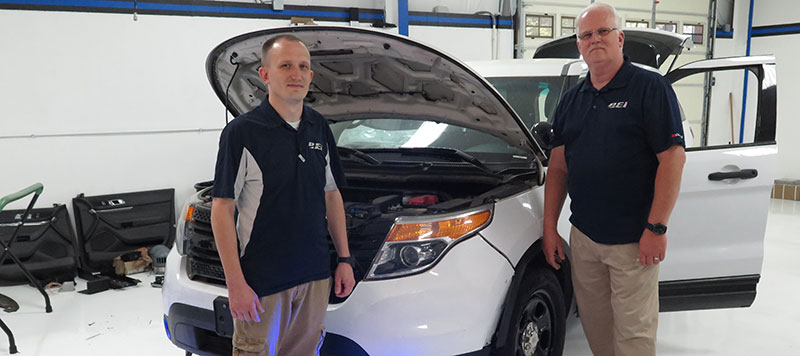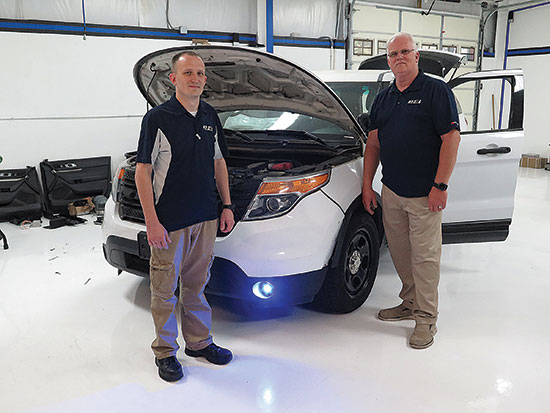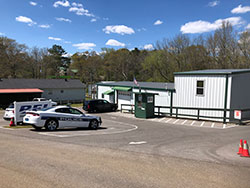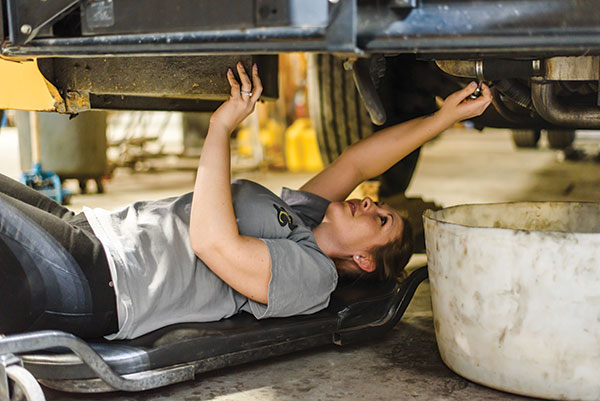
St. Clair women blaze trails
in male-dominated fields
Story by Elaine Hobson Miller
Photos by Kelsey Bain
The year 2020 marks the 100th anniversary of the passage of the 19th Amendment to the U.S. Constitution, the one guaranteeing women’s right to vote. It could also be the year that the Equal Rights Amendment, which guarantees equal legal rights for all Americans regardless of sex, becomes the 28th amendment.
While legal experts debate the uncertainty of the consequences of Virginia’s ERA ratification years after the original deadlines, along with the recisions of five other states, a couple of trailblazing women here in St. Clair County continue doing their jobs in male-dominated fields without concern for equal treatment.
In fact, Stephanie Foster, St. Clair’s first certified female school bus mechanic, and Belinda Crapet, the City of Springville’s first female police chief, say they got where they are with the help and encouragement of their male counterparts. For them, equal rights have never been an issue.
“The mechanics here (at the Pell City Schools bus shop) encouraged me to take the certification test, and they keep telling me I can do this,” Foster says. “Other mechanics sometimes make derogatory remarks at conferences and mechanic classes, but no one at the shop does.”
Foster, the second woman in the state to earn a school bus mechanic certification, is shop assistant for the Pell City Schools Transportation Department. Her primary job is behind a desk, where she handles morning dispatches and deals with parents calling about kids missing buses and drivers calling about fights among students.
She checks images that are captured from security cameras and sends digital copies to the Police Department when a video shows a driver not stopping while a school bus is loading or unloading. Occasionally, she fills in as a bus driver. A big part of her job is ordering parts, and being a certified mechanic comes in handy for that.
“Before, when a driverreported a problem, I had to get a work order to a mechanic, he would look at the bus, then a lot of times, I had to call a parts manufacturer for a diagram of the area where the problem was. Then the mechanic would identify which part was needed from the diagrams, and I would place the order,” she says. Now, she looks at the bus and diagrams, which she keeps on file, and determines herself which part to order. “It’s much more efficient this way,” she says. “The quicker we can get that bus back on the road, the better.”
She has been with the department since 2013 and was certified in January of last year. “You have to work in a shop five years before you can take the certification test,” she says. The three-part exam included an on-site, hands-on portion that involved a state instructor “bugging” a school bus. Foster found nine of the 10 changes the instructor made to the vehicle. “I missed the easiest one — the oil dipstick was missing,” she says.
Although she knows a piston ring from a push rod, shecan’t rebuild an engine. But she is familiar with all its parts. She helps with the state-required monthly bus inspections, hooking her laptop to the bus to find what’s causing engine lights to come on. She replaces fluids, light assemblies and switches. She is qualified to replace brake chambers, hazard and turn signal switches, and one of the most common problems in school buses — door switches. “They tend to break a lot on our new buses,” she says.
Drivers have to do safety pre-checks before each trip, mornings and after school. If they hear air escaping, or the air pressure gauge shows it isn’t building enough pressure, they know there is a leak. “I got certified because I wanted to be able to walk out to the bus and know what it is that’s leaking, not just say we have an air leak, but to tell them it’s the right rear brake chamber of a door that’s leaking air, for example,” says the 2010 graduate of Pell City High School. “Safety is important to me, and I wanted to make sure when I talk to our mechanics that I know what I’m talking about. I wanted to speak their language.”
The 27-year-old has always liked taking things apart to see what was inside and to learn how they worked. Her interest in mechanics developed as a teenager, when she hung out with her best friend, Patrick Ferguson, who worked on race cars, four-wheel drives and rock crawlers. “I was his sidekick, and he taught me a lot,” she says. She worked at Advance Auto Parts in Pell City and Leeds for two years, then as a painter’s prepper in a body shop.
Her husband, Joshua, paints vehicles for a living. The couple has two children. Their son, 7-year-old Tristan, thinks it’s cool to hang out at the shop with Mom each morning while awaiting his bus ride to school. Five-year-old Emma has shown no signs of following in Foster’s footsteps.
Kristy Lemley, shop secretary, was impressed when Foster did a road-side repair on a recent trip. “We were taking two buses to Transportation South, a bus dealer and repair shop, and the air line going to her seat busted,” Lemley said. “It made a loud noise, and Stephanie jumped. Then she hopped out of the bus, looked around and found the problem and fixed it. We went on with our trip.”
“They were air-ride seats, and mine dropped to the floor,” Foster recalls. “I couldn’t have driven the bus like that.”
“She doesn’t give herself enough credit,” says Lemley. “She can do my job, her job, the supervisor’s job and most of the jobs of our mechanics.”
Justin Turner and Greg Davis, the other two shop mechanics, spent a lot of time helping her prepare for the state exams.
“Without those two, I would not have made it through the test,” Foster says.
Davis says he and Turner “think the world of her” and that she has been a definite asset to the shop. “If just any woman had come up to me and wanted to be trained, I would have had reservations, but I knew Stephanie’s character,” Davis says. “She has always been wise beyond her years and driven to be successful at things she does, so I had no qualms about showing her how to become a mechanic. She’s a bulldog, and when she gets something into her head, she does it. Those qualities are hard to find in any gender these days.”
This woman answers to ‘Chief’
Belinda Crapet Johnson has those same “git-‘er-done” qualities. She didn’t grow up wanting to be a police officer. She stumbled into law enforcement for lack of something to do and discovered her true calling. “My youngest child was in kindergarten, and we lived across the street from Moody City Hall,” says Crapet, who uses her middle name professionally. “I walked over to see whether the city was hiring. I got a job as part-time dispatcher. I was trained on the job.”
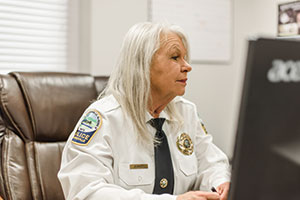
As a dispatcher, she would take a call, then send an officer to investigate. “I often wondered what happened on those calls,” she says. That curiosity led her to attend the Reserve (Weekend) Police Academy in 1992. “They don’t change anything in the academy because you are female,” she says. “Physical agility, firearms, all of the requirements and tests are standardized.” She prepared herself for the physical demands of the academy by running to get into shape.
Sometime during the early 1990s, central dispatch came into the county, eliminating her job with Moody. She went to work in the county probate office. She had already finished the academy by then, so when Moody had an opening for a police officer, she joined the force.
“I was was there six or eight years and was one of the first school resource officers in that city,” she says. “This was around the time of the Columbine (Colorado) school shooting.” She was a police officer in Odenville from 2001-2008, served briefly on the Ragland police force, then went to Springville in 2010. “I started as a patrol officer, was promoted to investigator, then I was appointed chief in 2018,” she says. “I had the rank of sergeant in Odenville but was hired as a patrol officer here.”
Although she’s the first female police chief for Springville, Crapet is quick to point out that she isn’t the first woman police chief in St. Clair County. “Branchville has had two women police chiefs, Wendy Long and the late Joann Lowe, and Argo has had one, Rebecca Downing,” she says.
According to a recent article by the Associated Press, only five of the nation’s 50 largest police departments are led by women. A 2013 survey by the National Association of Women Law Enforcement Executives showed only 169 women leading the more than 1,500 law enforcement agencies across the United States that responded to the survey. A 2018 survey reported by Statista, an online business data platform, said only 26.7% of law enforcement officers are female. Springville has two females out of 11 officers, including Chief Crapet.
Even though she’s the chief, Crapet doesn’t wear a full or Class A uniform all the time. “That’s for dress-up,” she says. She usually works in a Class B uniform, which consists of a Polo-type shirt and black or khaki pants. Her five children grew up seeing their mom in a police uniform, but her eight grandchildren and two great-grands are still getting used to the idea.
“The grandkids don’t usually see me with gun and badge,” she says. “One day I walked into the house of my 3-year-old grandson in full uniform and he said, ‘Nana, what are you doing?’ I said, ‘I’m a police officer.’ He just looked at me.’ Another grandchild had to do a history project and chose female law enforcement officers in Alabama as her topic.”
As for how she would feel about one of her grandchildren going into law enforcement, she says she would support her — or him. So far not one has expressed an interest in it. “I was school resource officer at Moody High School when my kids were there,” she says. “That was awkward for them.”
Her job requires a lot of administrative work in her office at City Hall. That office could best be described as “executive unisex.” A four-month dry-erase calendar hangs on a wall behind her large desk. “A Policeman’s Prayer” banner hangs on another wall, alongside a painting of rocking chairs and an American flag on a country front porch. Facing the desk is a flat-screen television hanging next to a Back-the-Blue wreath. A vacuum cleaner sits next to a coffee pot.
Theoretically, Crapet only has to spend 40 hours per week in her office or in her unmarked patrol car. Realistically, she is on call 24 hours a day. She doesn’t get called out much in the middle of the night, though. “I had to go out more when I was an investigator,” she says. “My husband hardly knew when I was gone.”
She likes getting out of the office, talking with business owners, their employees and people on the street. She wants them to know she cares. “I go to school events, too,” she says. “I’m best at community relations. I love that and working with children.”
Frank Mathews, a police investigator for Springville, has known Crapet for 17 years. “She’s a great chief, she’s doing an excellent job,” he says. “It’s the experience she has behind her that makes her so good. She’s been there, done that. She has come up through the ranks. Blue is blue — male or female.”
Springville Mayor William Isley says he recommended Crapet to the City Council upon the recommendation of former Chief Bill Lyle when Lyle retired. “She wears the hat well,” he says. “She works hard to retain the officers we have and makes sure they stay up-to-date on all their certifications. I’m impressed with her. She’s in a male-dominated profession, but this lady has walked into it and stood tall. She demands the respect of all who work for her. I fully support her in all she does.” Crapet says she and Cathy Goodwin, a lieutenant with the St. Clair County Sheriff’s Department, have been around longer than any other female law enforcement officers in the county. “I’ve got 29 years of service, 25 of them on the street,” she says. In all that time, she has caught no flack about being female, neither from fellow officers nor from people in the communities in which she has served. “I’ve had a lot of good mentoring from male officers through the years,” she says. “I’ve seen a lot of women come and go. I’m still here because I’m just stubborn. When you come into this field, as long as you realize you are held to the same standard as male officers, you will be fine.”













